This article was co-authored by Trudi Griffin, LPC, MS. Trudi Griffin is a Licensed Professional Counselor in Wisconsin specializing in Addictions and Mental Health. She provides therapy to people who struggle with addictions, mental health, and trauma in community health settings and private practice. She received her MS in Clinical Mental Health Counseling from Marquette University in 2011.
There are 16 references cited in this article, which can be found at the bottom of the page.
This article has been viewed 46,562 times.
Some people are chronic worriers, who are constantly expecting the worst. If it gets bad enough, you may even start catastrophizing and imagining the most devastating outcomes in every scenario. It can be challenging to get past this, but if you can teach yourself how to stop these thoughts while they’re developing, anything is possible. If you are in fears or hopelessness, take another look at the thought patterns that put and keep you there. You can work out of it all. Get help as needed, and don't give up.
Steps
Identifying Worry and Pessimism
-
1Notice areas of worry. Are you fearful when there are upcoming social engagements? Do you feel dread when you consider your job prospects? When you read the newspaper, do you feel like your future is dim? Write a list of topics, and list good points on each to focus positive attention on them, in turn.[1]
- Your fears and worries can be projections about possible problems in the future, obsessions over things that already happened and can't be changed, or preoccupations with things that could be insignificant but end up getting magnified through worry.
-
2Identify pessimistic thought patterns to turn around. You may feel like expecting worse scenarios as the "default" mode, but you are not aware that you are thinking negatively. But these thought patterns are harmful — they tear you down, are unproductive, and make you feel worse. Start becoming aware of these patterns by writing down your pessimistic thoughts and reversing them — carry a small notebook or use your smartphone.
- Examples might be to flip negatives to positives, "I'm [not] going to fail this test," "He's [not] going to reject me," "I've been using the bathroom a lot — [but] I probably [don't] have diabetes," etc.
- Be as specific as possible when you write down and correct these thoughts.[2]
Advertisement -
3Challenge your way of thinking. Instead of treating your negative thoughts as inevitable and true (like believing your friend is mad at you and will probably end the friendship), start to test and make-over these thoughts.[3] Take a piece of paper and write a negative thought at the top. Then start asking yourself the questions below, to get helpful alternatives, and writing out positive answers:[4]
- What evidence is there that this is true? What evidence is there against it? (i.e. "We've had fights before and we always work it out. Even when we had a big blow-up last year, we talked it through and we have a strong friendship.")
- Is there a different way you could look at the issue? Can you imagine a more positive outcome?
- What are the chances that this worst-case scenario will actually come true? What are other possible, more likely outcomes?
- Is this thought helping me or hurting me?
- What would I say to a friend who was thinking this way?
-
4Recognize that pessimism is unproductive. Sometimes people view expecting the worst as a way to prepare themselves or protect themselves from something bad happening. Their negative thoughts are a form of hyper-protection: if the person constantly anticipates the worst and thinks the worst of everything, he will never be surprised or disappointed. If this sounds like something you do, remind yourself that this kind of protective overdrive is hurting you, wasting your time with worry.[5]
-
5Identify the things over which you have some control. You may feel as though you have no control over your life — that you can work hard, do everything right, and it won't make any difference in the outcome. Or, you may think that you can somehow eliminate uncertainty and keep yourself safe from harm by anticipating a negative outcome in life. Remind yourself that you don't have complete control in your life — you can't control other people, the weather, etc. — but that you also aren't just along for the ride. You can control how you react and respond to things. You can control whether or not you take a chance, whether or not you get back up and try again when something goes wrong, whether you'll let a rejection from your crush spoil your year or if you'll let yourself feel disappointed and then work on moving forward.
- Ask yourself — does expecting the worse somehow give you control over other people? The weather? Does it change the outcome at all, or just make you feel low?
- If you always expect the worst in regards to your health, do what you can to improve your health. You can't control your genetics or some environmental factors, but you can eat healthily and get exercise, see the doctor if you think something is wrong.
- If you expect the worst of other people, consider losing your expectations entirely or dropping people who can't meet your needs. If your friends always let you down, ask yourself if what you are expecting from them is reasonable. Are you expecting them to be perfect? Or are you asking them to be supportive and they always tear you down? You can't control whether or not someone will do what you ask, but you can control how you respond. Try asking for what you need and letting go of the outcome by focusing on solving problems. If your needs are continually not met, then you may need to distance yourself from those people and find some more supportive friends.
Coping with Worry and Pessimism
-
1Reframe negative thoughts with a positive spin. Studies have shown that it is possible to retrain yourself to have a more positive outlook.[8] You'll have to consciously make an effort to stop when you find yourself expecting the worst and imagine a better, positive outcome. If you're walking into a job interview and saying to yourself, "There's no way I'm going to get this position," stop right there. Force yourself to think about the positive outcome you really want — "I'm going to nail this interview and do really well." This might seem strange or unfamiliar at first, but this is because you are learning a new skill. Stick with it.
- If you think "I'm too keyed up to fall asleep and I probably won't get any sleep tonight again and I'll be a wreck tomorrow," stop yourself and put it positively. "I want to fall asleep now, so I'm going to focus on relaxing."
- You can subtly "rewrite" your ordinary thoughts to be a little more positive. If you think "I don't know how to do that!" change it to, "I'm going to learn how to do that."
- When a positive thought comes to you, repeat it. Positive thoughts help you build resilience and create an upward spiral of emotional well-being.[9]
-
2Schedule worry time. If you are a chronic worrier, and you find that negative thoughts are ruining your pleasure and your focus, make a regular date with yourself to worry for a while. This could be daily, day-and-nightly, or weekly, depending on what works for you. Write the dates down, set a scheduled amount of time (maybe half an hour), and stick to it: really do sit down and worry at that time.[10]
- During your worry time, you can write about the things that you are worried about, or you can just sit and think through each of them.
- Do some problem solving if you want or just worry.
-
3Write it down. Keep a diary. Carry it with you. When you are full of gloom or fretfulness, put it on paper. Use your diary to get the anxiety out, but also use it to get back into the present moment. When you write, be very honest about how you feel and what you are thinking. Get all the details down.[11]
- Remember that the diary is for you and your thoughts, so don't worry about spelling, grammar, or sounding silly or strange. This is your place to express anything that's on your mind, no matter how small or large.
- You may want to write in your diary every night before bed, to get your worries out.
-
4Follow your worries to their logical conclusion. You may be in the habit of leaping from a possibility to its worst possible outcome. Instead of defying this habit, slow it down. Go step by step: what's the worst thing that could happen in each situation? If this happened, then what would happen? Start to turn it around into an exercise of problem solving. This can keep you from ruminating and help you start to feel empowered, reminding yourself that you have agency in your own life.
- Go through this until you can't go any further.
- Ask yourself what you need to approach the situation right now, then go about getting that thing.[12]
- For example, if you are constantly worried about losing your job, ask yourself: "Okay, say the worst has happened and I lost my job... What then?" You can search online and read the help wanted section every week; you can learn how to apply for unemployment; you can work your contacts to see if anyone has a lead on a job. This is very different than just thinking: "Why bother doing a good job? I'm just going to lose it anyway."
-
5Use humor and irony. When putting your fears and despairs in positive terms, you are employing the same skills you use when you make a joke or laugh at yourself: the ability to step outside of your emotion and see it from another angle. Humor is an excellent coping mechanism, and it really does make your thinking more flexible.[13]
- When you feel despair, you don't have to laugh it off, but you can ironize the drama of it all. If you feel lonely or abandoned while your partner is traveling, think "Oh poor me, I love someone and he's having fun and therefore I must suffer."
- Look for the silly upsides of your situation: "Well, I haven't had a serious relationship in two years, but on the plus side nobody's "borrowed" one of my sweaters permanently in that long either…"
- Talking with a good friend or family member who knows your patterns can help you learn this habit—gentle teasing can help you get out of a negative train of thought.
-
6Tune into your body. When you find yourself in the grips of a bad feeling, work to return to the present. Worry is a projection into an uninhabitable future: use somatic exercises to increase your mindfulness of the present.[14]
- Check in with your five senses: ask yourself what you are seeing, what you feel, what you smell, taste, and hear.
- Pay attention to your breath. If you are breathing quickly, try to breathe slowly and deeply.[15]
- Try tensing and relaxing each muscle in turn, slowly. Focus only on how your muscles feel.
- If you are deep in a panic, try wiggling your toes. This can wake you up into your body.[16]
Getting Help
-
1Talk to those you love. Invest in your social life. Spend time with loved ones. Share your anxieties: part of not suppressing your feelings is sharing them with others. When a loved one is not able to hear you out, consider writing them a letter, or asking if there's another time you can talk.[17]
- Spend time just having fun as well. Socializing may bring up certain anxieties in you, but it is ultimately healthier than isolation.
- Surround yourself with positive people. If you know people who have an upbeat outlook, who encourage you, and who make you feel good, spend more time with them.
-
2See a medical professional. Anxiety and depression are serious medical conditions. If you experience a sense of approaching danger or doom, you may have anxiety. If you cannot control your worries and put them aside, and if worry is interfering with your focus, this can also be anxiety. Following every possibility through to its worst possible result is a symptom of anxiety.[18]
- Anxiety can come with or without symptoms of depression.
- Any fear that interferes with your quality of life is likely a symptom of anxiety.
- See your doctor or make an appointment with a psychiatrist if you feel you might have anxiety or depression.
- If you experience suicidal thoughts, see your doctor immediately or call/text the United States Suicide and Crisis Lifeline: 988.
-
3Get help early and stick with it. The sooner you get help for anxiety, the easier it will be to manage it. Once you have a treatment plan in place, follow it and keep track of your progress. Your doctor may suggest talk therapy, and you may also be prescribed anti-anxiety medication. Once you have started either of these treatments, stay on them.[19]
- If you are not interested in medication, just let your doctor or therapist know. You have options.
- Ask about cognitive-behavioral therapy, which focuses on helping you identify and alter thought patterns.
- You may also join an anxiety management group.
- Consider living well part of your anxiety management plan: plenty of rest, exercise, good food, and mindful meditation.
Living Well
-
1Take risks. If you tend to expect the worst, you probably set a lot of barriers for yourself. Get in the habit of deconstructing these when you notice them. For instance, if you want to call a new friend to make a date, you might think "Oh she's probably busy, why would she want to be my friend, she's too afraid to tell me she doesn't want to be friends, if I pester her she'll never talk to me again." Instead, say "There's nothing wrong with asking someone to hang out. If she doesn't want to, I trust that she will tell me so or make a simple excuse."
- Try to do one little thing you're afraid to do every day.
-
2Figure out what you want and pursue it. Identify the things you most want, and start planning how to make them happen. If you suffer a failure, don't give up. Look past what you think may be expected of you — making lots of money, buying a house, having kids, etc. — and try to determine what it is that makes you happy. Once you have an idea of what you want, you can research what it will take to get it and start setting goals. If you need extra support for this, such as therapy or a life coach, don't hesitate to reach out.[20]
- If you're not sure what you want, try making a list of what is most important to you. It may be something abstract, like love, or something concrete, like money. Once you've done this, look over your list and try to see if there are any themes or beliefs that emerge. Maybe you notice a lot of the things that are important to you have to do with providing care and being around animals, but little to do with money or status. Maybe pursuing a life on an animal sanctuary would be a fulfilling path for you.
-
3Invest in your health. Being anxious or pessimistic can take a toll on your health, but your physical health can also affect your mood. Prioritize keeping your body in good shape, and your outlook will improve.
- Sleep enough. Adults need seven to nine hours a night, while children and teenagers need nine to 11 hours of sleep. Get into a regular sleep pattern where you go to bed and wake up at about the same time daily.[21] [22]
- Eat your three meals a day, with healthy snacks in between. Don't obsess over food, however: not everything needs to be healthy. Eat when you are hungry, and be mindful of portions. Be sure to eat a variety of foods, as this will get you the nutrients you need.[23]
- Exercise. Aim for about 150 minutes of moderate aerobic activity or 75 minutes of vigorous aerobic activity a week.[24] Exercise on a regular schedule, but notice when you need a little extra movement. When you are feeling really down, that might be your cue to get up and do something active, like a short walk or even a household chore.
- Avoid abusing substances. Alcohol and drugs can aggravate anxiety.
References
- ↑ http://www.mayoclinic.org/healthy-lifestyle/stress-management/in-depth/positive-thinking/art-20043950?pg=2
- ↑ http://www.helpguide.org/articles/anxiety/how-to-stop-worrying.htm
- ↑ http://www.helpguide.org/articles/anxiety/how-to-stop-worrying.htm
- ↑ http://www.helpguide.org/articles/anxiety/how-to-stop-worrying.htm
- ↑ http://www.helpguide.org/articles/anxiety/how-to-stop-worrying.htm
- ↑ http://www.helpguide.org/articles/anxiety/how-to-stop-worrying.htm
- ↑ http://www.helpguide.org/articles/anxiety/how-to-stop-worrying.htm
- ↑ http://www.ncbi.nlm.nih.gov/pmc/articles/PMC3807005/
- ↑ http://www.pbs.org/thisemotionallife/topic/happiness/helping-yourself
- ↑ www.nedac.co.uk/PDF/Dealing%20with%20Worry%20leaflet.pdf
- ↑ http://www.pbs.org/thisemotionallife/topic/happiness/helping-yourself
- ↑ www.myneurogym.com/.../MYM_Rosenberg_Anxiety_5.4.15_Final.pdf
- ↑ http://www.mayoclinic.org/healthy-lifestyle/stress-management/in-depth/positive-thinking/art-20043950?pg=2
- ↑ http://www.mayoclinic.org/healthy-lifestyle/consumer-health/in-depth/mindfulness-exercises/art-20046356?pg=1
- ↑ http://www.mayoclinic.org/healthy-lifestyle/consumer-health/in-depth/mindfulness-exercises/art-20046356?pg=2
- ↑ http://www.huffingtonpost.com/janelle-ann-mccarthy/what-anxiety-is-like_b_7045336.html
- ↑ http://www.mayoclinic.org/diseases-conditions/generalized-anxiety-disorder/basics/prevention/con-20024562
- ↑ http://www.mayoclinic.org/diseases-conditions/generalized-anxiety-disorder/basics/symptoms/con-20024562
- ↑ http://www.mayoclinic.org/diseases-conditions/generalized-anxiety-disorder/basics/prevention/con-20024562
- ↑ http://www.pbs.org/thisemotionallife/topic/happiness/helping-yourself
- ↑ http://www.mayoclinic.org/healthy-lifestyle/adult-health/expert-answers/sleep-and-weight-gain/faq-20058198
- ↑ http://www.mayoclinic.org/diseases-conditions/insomnia/expert-answers/lack-of-sleep/faq-20057757
- ↑ http://kidshealth.org/kid/stay_healthy/fit/fit_kid.html
- ↑ http://www.mayoclinic.org/healthy-lifestyle/fitness/basics/aerobic-exercise/hlv-20049447
About This Article
To stop expecting the worst, remind yourself that pessimism is unproductive and try challenging your negative thoughts with evidence to back them up. You can also work on reframing every negative thought you have with a positive spin. This may feel weird at first, but negative thinking is mostly a habit, and habits can be broken! If you are a chronic worrier, consider setting aside a short period of time, like half an hour per day or per week, to just worry. Write your negative thoughts and feelings down in a journal and give yourself room to vent. You may find that pouring out your negative feelings at controlled times, rather than trying to repress them all of the time, can help you see things more clearly in the long run. For more tips on breaking negative thought patterns, read on!












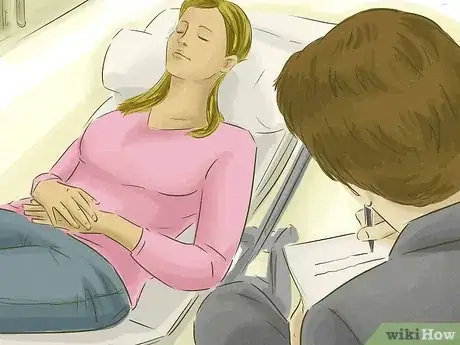
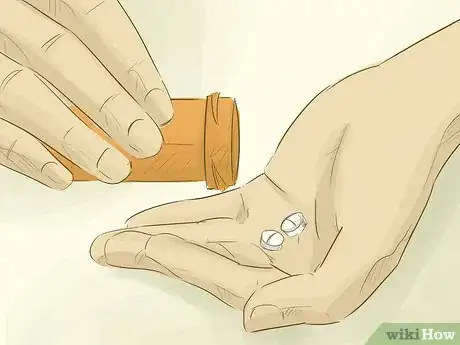
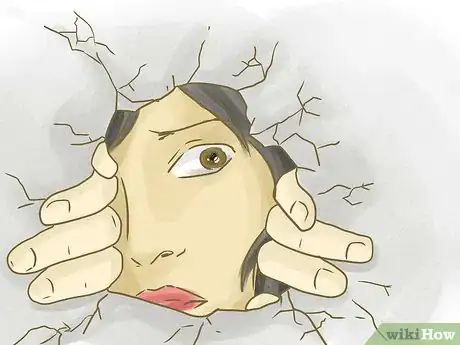

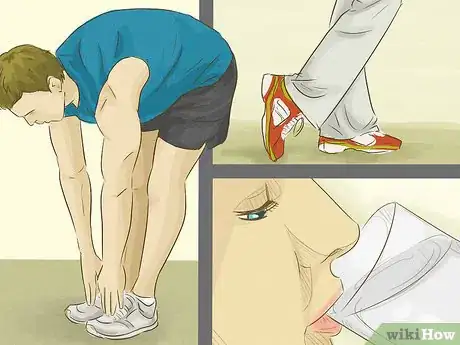





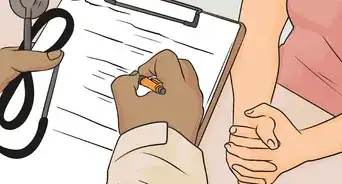























































Medical Disclaimer
The content of this article is not intended to be a substitute for professional medical advice, examination, diagnosis, or treatment. You should always contact your doctor or other qualified healthcare professional before starting, changing, or stopping any kind of health treatment.
Read More...